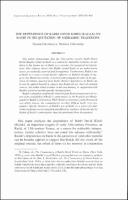Please use this identifier to cite or link to this item:
https://hdl.handle.net/20.500.12202/4622Full metadata record
| DC Field | Value | Language |
|---|---|---|
| dc.contributor.author | Grunhaus, Naomi | - |
| dc.date.accessioned | 2019-08-14T18:05:54Z | - |
| dc.date.available | 2019-08-14T18:05:54Z | - |
| dc.date.issued | 2003-04 | - |
| dc.identifier.citation | The dependence of Rabbi David Kimhi (Radak) on Rashi in his quotation of midrashic traditions. Grunhaus, Naomi. (Kamiaru-April 2003). The Jewish Quarterly Review 93(3-4): 415-430. | en_US |
| dc.identifier.issn | 0021-6682 | - |
| dc.identifier.uri | http://doi.org/10.1353/jqr.2003.0021 | en_US |
| dc.identifier.uri | https://hdl.handle.net/20.500.12202/4622 | - |
| dc.description | Scholarly journal article. | en_US |
| dc.description.abstract | This article demonstrates that the 13th-century exegete Rabbi David Kimhi (Radak) relied on Rashi as a source for midrashic traditions, in addition to his known use of Rashi as a resource for exegetical interpretations. This reliance shows that Radak viewed Rashi as an authoritative source for midrashic material and formulations. Furthermore, Radak's use of Rashi as a source reveals Rashi's influence on Radak's thought. It suggests that Radak learned the exegetical and pedagogical value of the quotation of rabbinic material from Rashi. Radak's dependence on Rashi can in turn be applied broadly to suggest that Radak did not check all original sources, but rather relied at times on his own memory in conjunction with Rashi's record of certain aggadic interpretations. Radak's quotation of midrashic material from Rashi demonstrates the extent of the availability of Rashi's commentaries on the Prophets and Hagiographa in Radak's environment. While Rashi's commentary on the Pentateuch was widely known, the commentaries on other biblical books were less popular. Specific instances of Radak's use of Rashi as a source for midrashic traditions are investigated and offered as evidence of heavier use by Radak of Rashi's commentaries than has previously been documented. | en_US |
| dc.language.iso | en_US | en_US |
| dc.publisher | University of Pennsylvania Press | en_US |
| dc.relation.ispartofseries | The Jewish Quarterly Review;93 (3-4) | - |
| dc.rights | Attribution-NonCommercial-NoDerivs 3.0 United States | * |
| dc.rights.uri | http://creativecommons.org/licenses/by-nc-nd/3.0/us/ | * |
| dc.subject | Rabbis | en_US |
| dc.subject | Furunculosis | en_US |
| dc.subject | Pentateuch | en_US |
| dc.subject | Psalms | en_US |
| dc.subject | Radius | en_US |
| dc.subject | Time dependence | en_US |
| dc.subject | Talmud | en_US |
| dc.subject | Paraphrase | en_US |
| dc.subject | Literature | en_US |
| dc.subject | Rabbi David Kimhi (Radak) | en_US |
| dc.subject | Midrashic traditions | en_US |
| dc.subject | Rashi, 1040-1105. | en_US |
| dc.title | The dependence of Rabbi David Kimhi (Radak) on Rashi in his quotation of midrashic traditions. | en_US |
| dc.type | Article | en_US |
| local.yu.facultypage | https://www.yu.edu/faculty/pages/grunhaus-naomi | |
| Appears in Collections: | Bernard Revel Graduate School of Jewish Studies (BRGS): Faculty Publications | |
Files in This Item:
| File | Description | Size | Format | |
|---|---|---|---|---|
| Naomi Grunhaus JQR article.pdf.pdf | PDF offprint from author NG | 2.69 MB | Adobe PDF |  View/Open |
This item is licensed under a Creative Commons License

